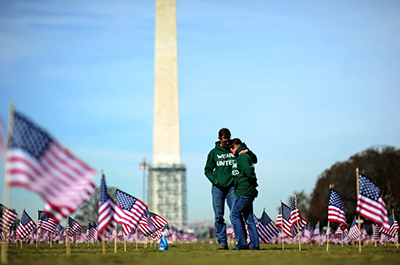
By Melissa Chan
More military veterans died by suicide than the Department of Veterans Affairs had previously reported, a new study found.
The number of suicides among former service members is 1.37 times greater in eight states than the VA had reported from 2014 to 2018, according to a study released Saturday by America’s Warrior Partnership (AWP), a national nonprofit organization that works to end veteran suicide.
If those states represent a national rate, that will mean about 24 veterans die by suicide each day, compared with the VA’s average of 17.7 suicides in that time frame, the report found.
“It’s devastating,” said Jim Lorraine, AWP’s president, who served in the Air Force for 22 years. “I’m not only a veteran myself. My son serves, my son-in-law serves. My wife is a vet. I know a lot of veterans who have died from suicide.”
The report examined data from Alabama, Florida, Maine, Massachusetts, Michigan, Minnesota, Montana, and Oregon. Those eight states, which represent 18% of all U.S. veterans, were the only states to provide usable data, AWP said, adding that most states had been barred from releasing data because of confidentiality restrictions.
Researchers said the discrepancy likely resulted from human error and a lack of resources that led states to undercount and mislabel veteran deaths
“We’re not pointing fingers at anyone,” Lorraine said. “We’re just saying it’s sobering to look at the numbers.”
Veterans who served less than three years were at the greatest risk of suicide, the report found, and the odds of dying by suicide increased by 56% if the veteran had received a demotion.
The report said former members of the Coast Guard were most likely to die by suicide, followed by Marine Corps, Army, Navy, and Air Force service members
AWP said the data was corroborated by the Defense Department and state records. The group said the VA was “willing to discuss participation from the beginning,” but the agency could not share identifiable data because of regulations that protect veteran privacy.
In a statement, VA press secretary Terrence Hayes said ending veteran suicide was the agency’s top clinical priority, and that the methodology behind the VA’s National Suicide Prevention report was “well-established and consistent
“We take every step possible to make sure that our veteran suicide data is accurate, because the first step to solving this problem is understanding it,” Hayes said.
“The bottom line is this,” Hayes continued. “One veteran suicide is one too many, and VA will continue to accurately measure veteran suicide so we can end veteran suicide.”
Suicide is a national public health issue, with more than 45,000 Americans dying by suicide each year
More than 46,000 American adults died by suicide in 2018, including more than 6,000 veterans, the VA said in its 2020 report. In its latest report, the VA said there were 399 fewer veteran suicides in 2019 than the year before.
AWP, which launched in 2014, hopes more states will participate in the study’s next phase.
Lorraine said better collaboration would improve the accuracy of the data and lead to better prevention methods, which vary from one community to the next, depending on the demographics of the veteran population and other factors.
“This study belongs to the nation,” said Lorraine, who retired in 2005 after nine combat deployments
At the time, Lorraine was the deputy command surgeon for the U.S. Special Operations Command, which oversees special operations within the Army, Marine Corps, Navy, and Air Force within the Defense Department.
“Together, we can do better,” he said. “We can make a significant dent.”
If you or someone you know is in crisis, call 988 to reach the Suicide and Crisis Lifeline. You can also call the network, previously known as the National Suicide Prevention Lifeline, at 800-273-8255, text HOME to 741741 or visit SpeakingOfSuicide.com/resources for additional help.


Be the first to comment